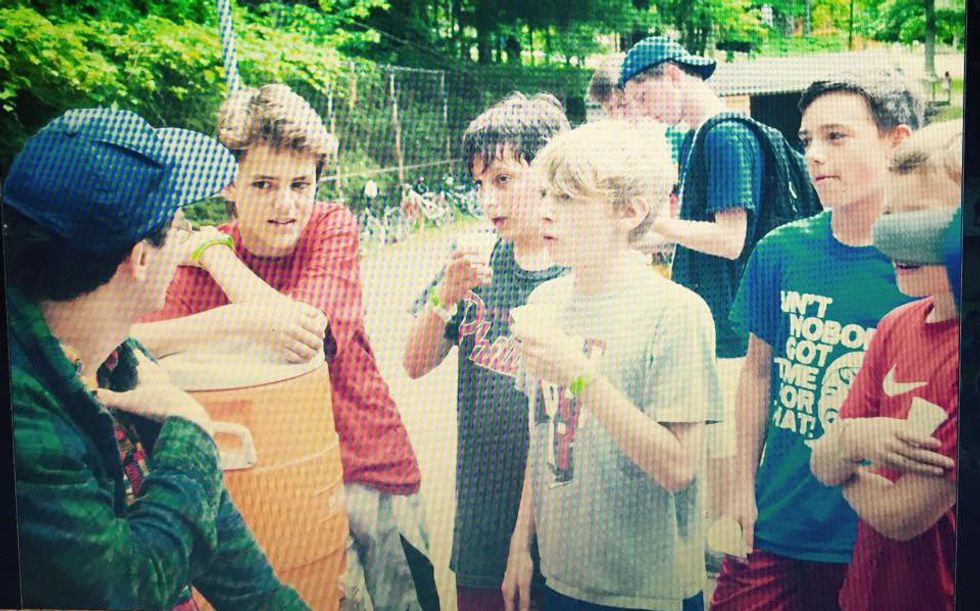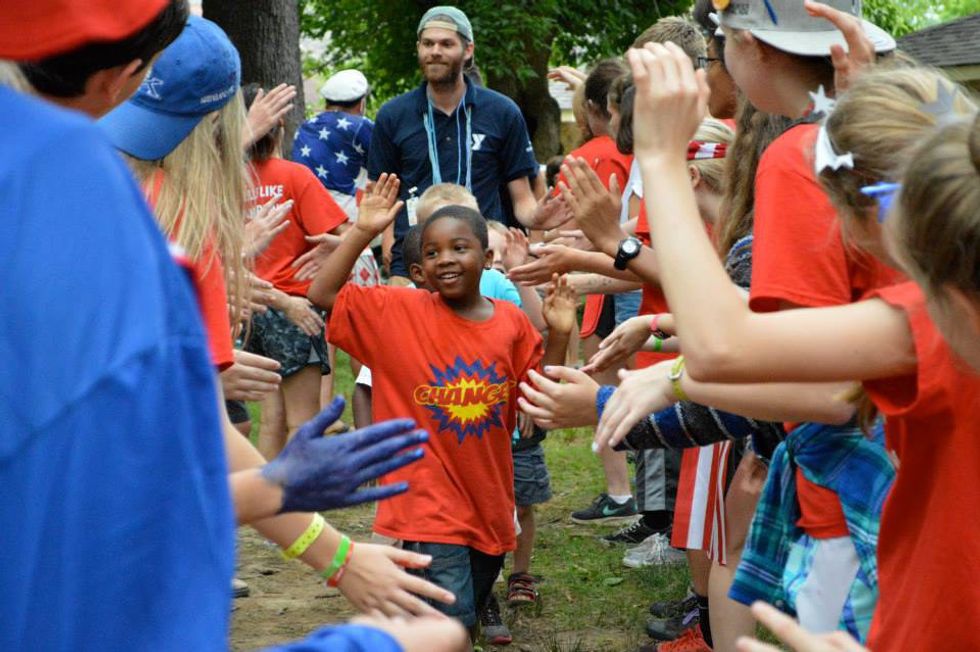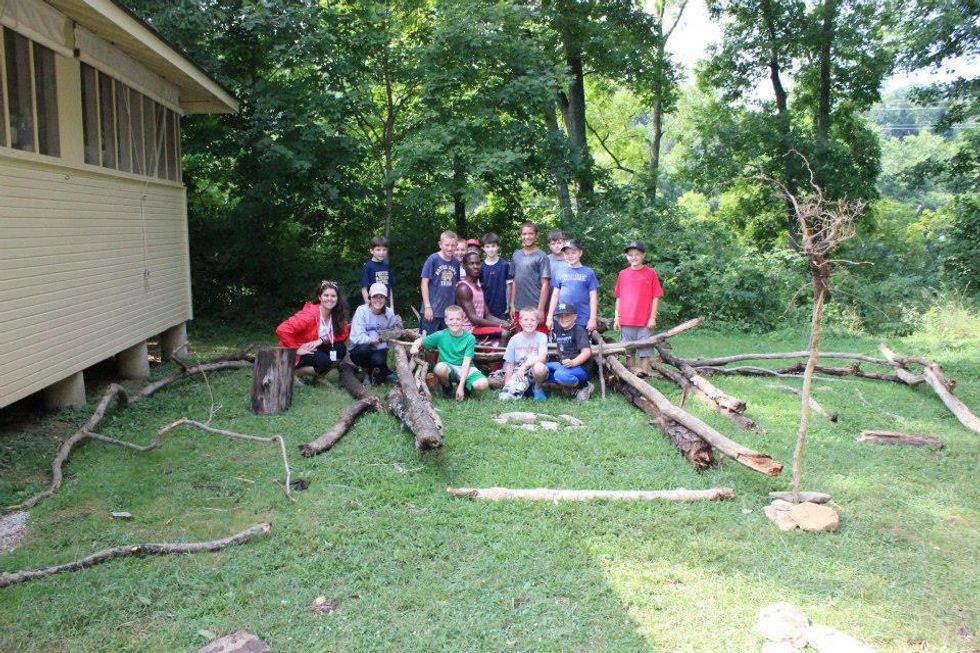I could never really put into words how thankful I am for the way summer camp has changed my life and taught me so much about how to live in this world. My words might never be enough, but I figured I'd at least try to convey some of the wonderful lessons summer camp can teach everyone about being a better human being, becoming someone who can successfully navigate the world in which we live. Here's a short list of the skills you can learn at camp!
1. How to not take yourself too seriously
Whether you're a camper who's forced to do something "strange and wonderful" like proposing to a tree in order to get out of jail during a camp-wide game of Capture the Flag, or a counselor who's forced to endure mud-pies to the face at the hands of your campers, there's nothing like the free-spirited nature of summer camp to teach you how to let loose and be ridiculous from time to time.
2. How to live with people other than your family
If you never attend summer camp, chances are the only nights you'll ever spend away from home before going to college are going to be when you're on family vacation or sleepover at someone else's house. A week or two at camp isn't just a slumber party though: you're living and breathing in the same cabin as a dozen or more other campers for many nights in a row. As a child, learning to navigate the dynamics of living with others can be remarkably beneficial in helping to ease the transition to a college dorm.... and realistically, most college dorm rooms are just as messy as a cabin with a dozen 10-year-old kids!
3. How to resolve conflict
Conflict is a reality of life, and summer camp is simply a microcosm of life. The intimate environment of summer camp allows for terrific learning opportunities in the realm of conflict resolution. Campers learn to respectfully address concerns with their cabin-mates (like the kid who just can't stand their bunkmate's incessant harmonica playing), and counselors learn how to mediate between campers who have a difficult time speaking constructively to each other. Given the reality of conflict throughout all walks of life, learning how to resolve it in a safe environment such as summer camp provides great benefits for campers and counselors in the future.
4. How to listen to others
Listening to others can be related to conflict management, but it also transcends situations of mere disagreement. The ability to listen to others is perhaps one of the most important skills anyone can have, because feeling heard is one of the most validating and empowering experiences for a child (or a person of any age, for that matter). Counselors are around to give campers the best possible experience and that might mean sitting on a picnic table listening to a camper ramble about some comic book you don't care about for 15 minutes straight. It might mean being attentive to a camper who decides to trust you with something that weighs on them emotionally. It might mean remembering some minuscule fact your camper shares with you, because they expect you to care about it. Camp provides all sorts of unique, small moments within which campers and counselors alike can hone their listening skills, learning how to interact with other human beings in a way that demonstrates true empathy.
5. How to hold yourself accountable
At camp, a prevailing atmosphere of mutual trust seems to permeate the air. As they say, though, trust is an easy thing to break and a difficult thing to repair. Thus, accountability plays an extraordinary role in the camp experience. If you tell your campers that you're going to wake them up early so they can jump in the ice-cold lake, you can't let them down. There's an implicit expectation that most campers have of their counselors, and that's to be everyday superheroes for the entirety of their time at camp. The more time you spend at camp, the more you embrace that pressure...by holding yourself accountable for the expectations of others, you build their trust and companionship -- qualities important for relationships in all aspects of life.
6. How to accept others' love
Something about being at camp inspires everyone to see the best in each other. If you're on the receiving end of this type of love, it can be sort of overwhelming at first. As a young camper, you may ask yourself, "Wait, do they really appreciate my love for bugs?", or you may be left wondering "Why on earth do these people think I'm cool for winning a card game?" A large part of why people often feel appreciated at camp has to do with the aforementioned ability that counselors have for truly making people feel heard. This can be disconcerting at first because, frankly, it's not something many people grow up with. After getting over the initial surprise of feeling heard, though, you can feel immensely empowered by accepting the love others share with you -- particularly demonstrated through their willingness to listen and be empathetic.
7. How to love yourself
Hand in hand with accepting others' love comes the ability to love yourself. Self-love can be a difficult thing to achieve. Self-doubt can creep in easily, and from a young age children can self-deprecate if their school, family, or social life isn't particularly rewarding. The environment of love that exists at summer camp is truly magnificent, and the power of love can shatter previously held beliefs of inadequacy. Sometimes it's hard to love yourself until others show you love, and camp is certainly full of love to be shared with anyone who has the opportunity to spend some time there.
8. How to be selfless
In an environment defined by interpersonal interaction and relationship building, selfishness has no place. It's not even as if selfishness is openly condemned and punished, it's just that selflessness is so highly valued, it's nearly impossible not to hop on the selflessness train! It'd be all too easy for counselors to hoard food from their campers, or for campers to refuse to share the snacks their parents send them with, but at camp it's easy to learn how rewarding it can feel to share what you have with others and bring happiness to the lives of the people who surround you.
9. How to maintain friendships
One of the saddest parts of camp is that it's finite - weeks end, summers end, and you have to go back into the "real world." You meet a lot of people at camp and invest in some beautiful friendships while you're there, but then it all ends. The friendships don't have to end, though. In our technological age of instant connection, maintaining relationships with camp friends while you're not at camp has been simplified. The ability to stay in touch with friends gains immense importance as you grow up, when you go off to college away from your high school pals, and when you get out into the real world and find yourself starting a family of your own. Learning how to maintain relationships as a child, then, certainly pays off when you're an adult.
10. How to disconnect and appreciate the outdoors
A downside to how connected we are to technology is that it's far too easy to stay holed up inside, playing video games or messaging your friends online and never really getting out to DO anything. We've got a big, beautiful planet full of natural wonders and subtle pleasures just waiting to be explored. As we dive deeper into the world of technology, we risk becoming dangerously disconnected from our natural world. The role camp plays in getting children outside carries greater importance in this current era than perhaps it ever has before. There's nothing quite like spending your whole day in the sun, and camp provides that experience in a special kind of way.
11. How to take care of yourself
You've only got one life to live, so you might as well take care of yourself to make sure you get the most out of it. Camp sure teaches you how to do that. The days are long and grueling, especially if you're a counselor. Camp teaches you how to give 110 percent without destroying yourself. The lessons of self-care that camp teaches can be applied to all walks of life, and go a long way in helping you achieve happiness and satisfaction.























